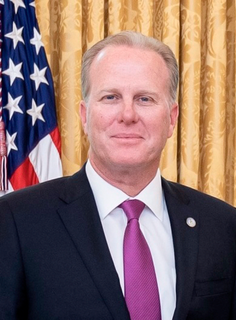Top 872 Wages Quotes & Sayings
Explore popular Wages quotes.
Last updated on April 13, 2025.
The study titled 'Impact of Immigration on Wages, by Education Level, 1994-2007' found that increased immigration had an effect of lowering wages for earlier immigrants by an average of 4.6 percent. Running counter to popular perception is the finding that for native-born Americans, wages actually increased by 0.6 percent.
It is not the actual greatness of national wealth, but its continual increase, which occasions a rise in the wages of labour. It is not, accordingly, in the richest countries, but in the most thriving, or in those which are growing rich the fastest, that the wages of labour are highest. England is certainly, in the present times, a much richer country than any part of North America. The wages of labour, however, are much higher in North America than in any part of England.
Requiring the payment of higher wages will lead to a loss of some jobs and a raising of prices which drives companies to search for automation to reduce costs. On the other hand, those receiving higher wages will spend more (the marginal propensity to consume is close to 1 for low income earners) and this will increase demand for additional goods and services. Henry Ford had the clearest vision of why companies can actually benefit by paying higher wages.
We'll have a national dispute - debate about it, and the goal should be to bring in - to help respectfully appeal to those voters that can make the difference, the ones who are not going to be entrepreneurs, are never going to be - run a - be a CEO in some big business, and they know it, but they would like to have their Social Security, they would like to have Medicare as they paid for all their years, and they'd like rising wages rather than falling wages.
The working classes may be injuriously degraded and oppressed in three ways:
1st - When they are neglected in infancy
2nd - When they are overworked by their employer, and are thus rendered incompetent from ignorance to make a good use of high wages when they can procure them.
3rd - When they are paid low wages for their labour.
Wages? You want to be wage slaves? Answer me that! Of course not. What is it that makes wage slaves? Wages! I want you to be free. Strike off your chains! Strike up the band! Strike three you're out! Remember, there's nothing like Liberty, except Colliers and The Saturday Evening Post. Be free, now and forever. One and individual. One for all and all for me, and tea for two and six for a quarter.
Would you rather have cheap, subsidized - illegally subsidized - goods dumped into the Wal-Mart and not have a job and not have your wages go up in 15 years, or would you like to pay a little bit more - not much - a little bit more, have a job, and have your wages going up? I think the American people are going to make that choice.
You know, when I was in college, there was a big debate: Do unions raise wages? Well, with regard to industrial unions, there were arguments back and forth -- international competition. It is now clear, I think, that whether or not you think unions raised wages 50 years ago, the absence of unions and their weakness that is inflicted by anti-union public policy depresses wages. The fact is that people who are not represented, in the service industries in particular, are the victims of policies which depress their wages.
I have had the view that cutting wages is not the path to prosperity, and one of the great myths propagated about my attitude to industrial relations is that I believe in lower wages. I've never believed in lower wages. Never. Never believed in lower wages, I've never believed in lower wages as an economic instrument.
Sharp increases in the minimum wage rate are also inflationary. Frequently workers paid more than the minimum gauge their wages relative to it. This is especially true of those workers who are paid by the hour. An increase in the minimum therefore increases their demands for higher wages in order to maintain their place in the structure of wages. And when the increase is as sharp as it is in H.R. 7935, the result is sure to be a fresh surge of inflation.
I don't know if I ever mentioned back in 2002 we fought our way into a governor's debate in Massachusetts where, you know, this was televised and I articulated our usual agenda: cut the military, put the dollars into true security here at home, provide healthcare as a human right, raise wages which needed to be living wages, green our energy system, equal marriage? - we were the only ones talking about it back in 2002.
We've long known that firms can pay higher wages if they spend less on workplace safety enhancement. Libertarians ask, "If a worker is willing to accept higher wages in return for his agreement to exercise greater caution while performing his job, why should the government prevent him from making that choice?" It's a rhetorically powerful question, yet it overlooks the fact that the agreement in question will have adverse effects on others.
The Trump administration's economic agenda is the right agenda. Corporate taxes have been driving capital and brains and companies overseas for a decade. It has caused huge damage in investment and jobs and productivity. It was a mistake. We have to fix it. Counterintuitively, that usually helps middle-class wages, and lower-class wages, and job formation.
If workers are overworked, or companies hire temps at low wages, this fundamentally comes down to the quality of life for a person. It's bigger than wages. They should be able to spend time with their families. And if they're single, they should be able to have fun and not spend every day of their life working 12 to 15 hours a day and never get a chance to take care of their well-being. To me, that's part of living a good life.
I think that people have been looking at 40 years of flat wages. You know, the reality is you've got folks in diners and hair shops and barber shops all over this country who look at their own lives and think, you know, "My parents did better than I'm doing and my kids might not do as well as I'm doing." And that's because wages have been slashed for so long.
If a market exists for low-paid work, then we should think about how we can make this type of work more attractive by providing government assistance. Of course, the wage-earner must be able to live off of his wages. We will not allow poverty wages or dumping wages. But the wage earner can receive a combined wage that includes both his actual wages and a government subsidy.
Democrats in Washington predicted that tax cuts would not create jobs, would not increase wages, and would cause the federal deficit to explode. Well, the facts are in. The tax cuts have led to a strong economy. Real wages were on the rise, and deficit has been cut in half three years ahead of schedule.
In my Inaugural I laid down the simple proposition that nobody is going to starve in this country. It seems to me to be equally plain that no business which depends for existence on paying less than living wages to its workers has any right to continue in this country. By "business" I mean the whole of commerce as well as the whole of industry; by workers I mean all workers, the white collar class as well as the men in overalls; and by living wages I mean more than a bare subsistence level - I mean the wages of decent living.


















































